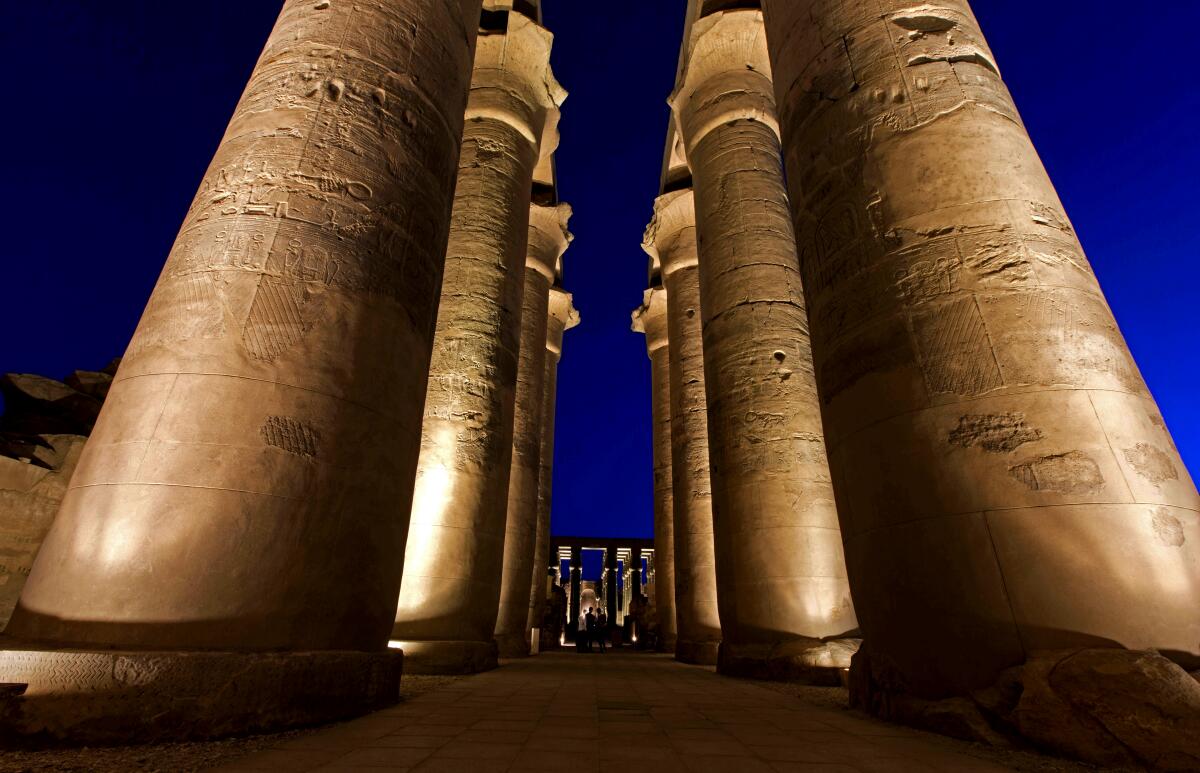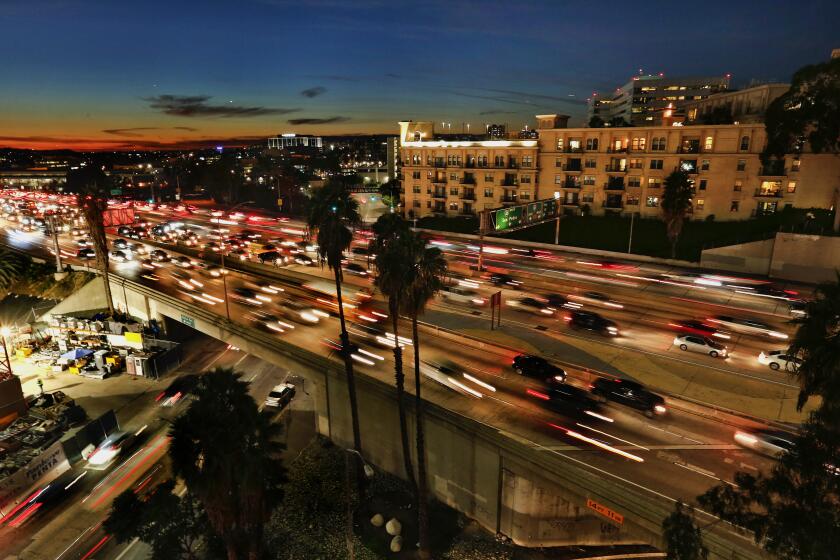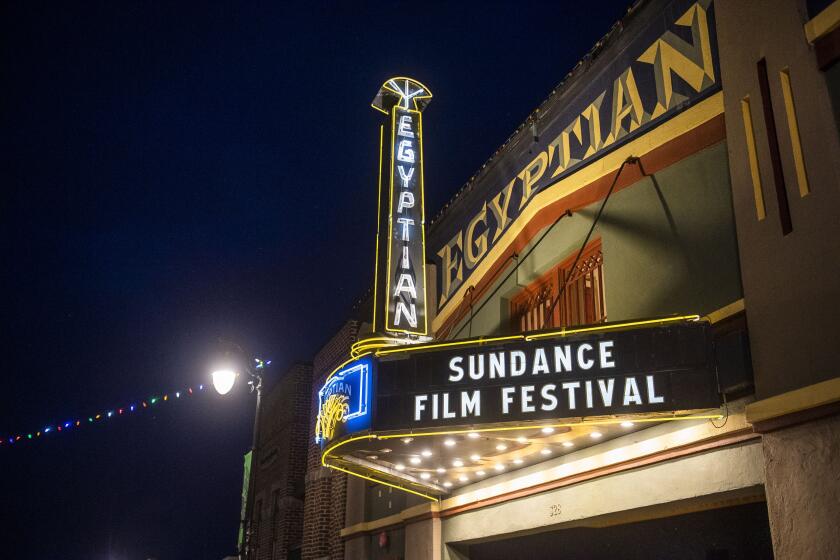Op-Ed: Searching for ties to the Middle East in my mother’s old photos

- Share via
Among a stack of photos from my mother’s childhood is a black-and-white picture from when she was 7 or 8. She’s standing on the sunlit balcony of her family’s apartment in Cairo. Her face looks directly into the camera, half in shadow.
Revisiting old photographs has become like the rituals my mother tried to preserve at our home in Ohio — the way she’d prepare Turkish coffee when my maternal grandmother would visit; the lamb she’d cook at Christmas with slivers of almonds and raisins buried in the rice; her love of Egypt’s legendary singer Umm Kulthum, whose melodic and low voice my mother taught me was like a sadness.
It wasn’t sudden like a spark, but gradual with time, that I realized the full extent of what I’d lost when my mother died 12 years ago. In addition to her presence in my life, her voice, any fight we’d ever have again, what dissipated like dew was a tangible connection to the Middle East. For me, photos have bridged the loss.
My Mexican grandparents, Japanese grandmother and English grandfather from India became Angelenos. I try to hold on to their memories in this city.
My 95-year-old grandmother has created her own rituals of remembrance, collecting items in the spare bedroom in her apartment in Montreal into a shrine of her daughter’s things: Paintings, photographs and handwritten cards hang on the walls and spill over the end table.
“You can have anything you want in here,” she said, the last time I visited, as if removing one item would relieve some unseen pressure.
In many ways, we use rituals to tether us to a particular place or a community of people. I see now that my mother’s rituals were her small ways to hold on to what she and my dad left behind before immigrating to the U.S. It was also her way to tether my brother and me — American-born children — to where our family came from.
I am learning that rituals are not just old practices that are passed down through generations. They can be something new and created — like a habit or a process — to deal with loss and the heavy weight of grief.
Since my mother died, I have been curating an envelope of photographs from our family trips to Egypt. Here I am — at 6 and 12 and 17. You’ll catch our faces in front of the pyramids or standing by the Nile River in either Luxor or Aswan. There we are with extended family in their Cairene apartments, our bulky sweaters giving away the time of year. Here I am eating pigeon for the first time, an Egyptian delicacy, my mother would tell me, as I licked the grease from my fingers, trying not to look too closely at the shape of the small, delicate body on my plate.
These are mixed with black-and-white photos from when my mom was a kid — like the one on the balcony — many unmarked, devoid of location or date or time.
I piece together clues. My mother and her mother on top of cragged rocks in front of an unnamed sea, faces windswept and out of focus. My mother’s school headshot — this one with a date — she’s 15 and frozen as a gangly teen with a gap in her teeth she chose to never fix.
I inherited these boxes of family photographs after she died. Each time I tried to remove a cardboard lid and put order to the chaos of the images inside, I became instantly overwhelmed: “How,” I asked myself, “can I possibly do this without her?”
Over time, I turned the weight into a ritual. I periodically open a dented box, pull out one or two photos I remember or want to know more about and put them in a separate envelope. I tuck the envelope into my desk drawer and close the door until I have an urge to look at them.
Muslim filmmakers want to tell stories where our humanity is assumed, not up for debate.
I don’t know what I’m looking for in this bouquet of photographs. But the process of finding a long-lost photo brings me back to everything I miss that made the Middle East come alive in our every day: the sound of my mother’s Arabic and French, mixed in a messy sentence; the traditional meals she cooked — kofta, kousa, ful and taamiya, basboosa and baklava; the smells of her spice rack and her pantry, like another family member. All of it returns as two-dimensional images invoke whole scenes and trigger every sense.
My grandmother told me this year that she’d like my 8-year-old daughter to have her old photographs, as if this is another of her own rituals, the transfer of memories to the next generation.
I didn’t respond, worried about what it would mean for my daughter to carry the weight of unnamed faces, unmarked places and unknown dates with her in tattered boxes.
But perhaps it’s not for me to say.
Perhaps it’s up to my daughter to uncover her own ritual among these photos, and to weave together the pieces she hopes never to lose.
Yasmin Mariam Kloth is a poet in Cincinnati. Her debut collection, “Ancestry Unfinished: Poems of a Lost Generation,” is about her family memories and the Middle East. @yasminkloth
More to Read
A cure for the common opinion
Get thought-provoking perspectives with our weekly newsletter.
You may occasionally receive promotional content from the Los Angeles Times.











